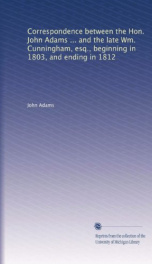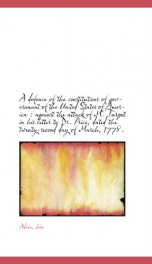Adams John

John Adams (October 30, 1735 – July 4, 1826) was an American politician and the second President of the United States (1797–1801), after being the first Vice President (1789–1797) for two terms. He is regarded as one of the most influential Founding Fathers of the United States. Adams came to prominence in the early stages of the American Revolution. As a delegate from Massachusetts to the Continental Congress, he played a leading role in persuading Congress to adopt the United States Declaration of Independence in 1776. As a representative of Congress in Europe, he was a major negotiator of the eventual peace treaty with Great Britain, and chiefly responsible for obtaining important loans from Amsterdam. Adams' revolutionary credentials secured him two terms as George Washington's vice president and his own election as the second president of the United States. During his one term as president, he was frustrated by battles inside his own Federalist party (by a faction led by Alexander Hamilton) and the newly emergant bi-partisan disagreements with Jeffersonian Republicans. During his term he also signed the controversial Alien and Sedition Acts. The major accomplishment of his presidency was his peaceful resolution of the Quasi-War crisis with France in 1798. After Adams was defeated for reelection by Thomas Jefferson (at the time Adams' vice-president), he retired to Massachusetts. He and his wife Abigail Adams founded an accomplished family line of politicians, diplomats, and historians now referred to as the Adams political family. Adams was the father of John Quincy Adams, the sixth President of the United States. His achievements have received greater recognition in modern times, though his contributions were not initially as celebrated as those of other Founders'. John Adams, Jr., the eldest of three sons,[1] was born on October 30, 1735 (October 19, 1735 Old Style, Julian calendar), in what is now Quincy, Massachusetts (then called the "north precinct" of Braintree, Massachusetts), to John Adams, Sr., and Susanna Boylston Adams.[2] The location of Adams's birth is now part of Adams National Historical Park. His father, also named John (1691–1761), was a fifth-generation descendant of Henry Adams, who emigrated from Braintree, England to Massachusetts Bay Colony in about 1638. He is descended from a Welsh male line called Ap Adam.[3] His father was a farmer, a Congregationalist (that is, Puritan) deacon, a lieutenant in the militia and a selectman, or town councilman, who supervised schools and roads. His mother, Susanna Boylston Adams,[4] was a descendant of the Boylstons of Brookline. Adams was born to a modest family, but he felt acutely the responsibility of living up to his family heritage: the founding generation of Puritans, who came to the American wilderness in the 1630s and established colonial presence in America. The Puritans of the great migration “believed they lived in the Bible. England under the Stuarts was Egypt; they were Israel fleeing …to establish a refuge for godliness, a city upon a hill.”[5] By the time of John Adams's birth in 1735, Puritan tenets such as predestination were no longer as widely accepted, and many of their stricter practices had mellowed with time, but John Adams “considered them bearers of freedom, a cause that still had a holy urgency.” It was a value system he believed in, and a heroic model he wished to live up to.[6] Young Adams went to Harvard College at age sixteen (in 1751).[7] His father expected him to become a minister, but Adams had doubts. After graduating in 1755, he taught school for a few years in Worcester, allowing himself time to think about his career choice. After much reflection, he decided to become a lawyer and studied law in the office of James Putnam, a prominent lawyer in Worcester. In 1758, Adams was admitted to the bar. From an early age, he developed the habit of writing descriptions of events and impressions of men which are scattered through his diary. He put the skill to good use as a lawyer, often recording cases he observed so that he could study and reflect upon them. His report of the 1761 argument of James Otis in the superior court of Massachusetts as to the legality of Writs of Assistance is a good example. Otis’s argument inspired Adams with zeal for the cause of the American colonies.[8] On October 25, 1764, five days before his 29th birthday, Adams married Abigail Smith (1744–1818), his third cousin[9] and the daughter of a Congregational minister, Rev. William Smith, at Weymouth, Massachusetts. Their children were Abigail (1765–1813), future president John Quincy (1767–1848), Susanna (1768–1770); Charles (1770–1800), Thomas Boylston (1772–1832), and the stillborn Elizabeth (1775). Adams was not a popular leader like his second cousin, Samuel Adams. Instead, his influence emerged through his work as a constitutional lawyer and his intense analysis of historical examples,[10] together with his thorough knowledge of the law and his dedication to the principles of republicanism. Adams often found his inborn contentiousness to be a constraint in his political career. Adams first rose to prominence as an opponent of the Stamp Act of 1765, which was imposed by the British Parliament to pay off British war debts as well as the expense of keeping a standing army in the American colonies. Popular resistance, he later observed, was sparked by an oft-reprinted sermon of the Boston minister, Jonathan Mayhew, interpreting Romans 13 to elucidate the principle of just insurrection.[11] In 1765, Adams drafted the instructions which were sent by the inhabitants of Braintree to its representatives in the Massachusetts legislature, and which served as a model for other towns to draw up instructions to their representatives. In August 1765, he anonymously contributed four notable articles to the Boston Gazette (republished in The London Chronicle in 1768 as True Sentiments of America, also known as A Dissertation on the Canon and Feudal Law). In the letter he suggested that there was a connection between the Protestant ideas that Adams's Puritan ancestors brought to New England and the ideas behind their resistance to the Stamp Act. In the former he explained that the opposition of the colonies to the Stamp Act was because the Stamp Act deprived the American colonists of two basic rights guaranteed to all Englishmen, and which all free men deserved: rights to be taxed only by consent and to be tried only by a jury of one's peers. The "Braintree Instructions" were a succinct and forthright defense of colonial rights and liberties, while the Dissertation was an essay in political education. In December 1765, he delivered a speech before the governor and council in which he pronounced the Stamp Act invalid on the ground that Massachusetts, being without representation in Parliament, had not assented to it.[12] In 1770, a street confrontation resulted in British soldiers killing five civilians in what became known as the Boston Massacre.[13] The soldiers involved, who were arrested on criminal charges, had trouble finding legal counsel. Finally, they asked Adams to defend them. Although he feared it would hurt his reputation, he agreed. Six of the soldiers were acquitted. Two who had fired directly into the crowd were charged with murder but were convicted only of manslaughter. As for Adams's payment, Chinard alleges[14] that one of the soldiers, Captain Thomas Preston, gave Adams a symbolic "single guinea" as a retaining fee, the only fee he received in the case. However, David McCullough states in his biography of Adams that he received nothing more than a retainer of eighteen guineas.[15] Adams's own diary confirms that Preston paid an initial ten guineas and a subsequent payment of eight was "all the pecuniary Reward I ever had for fourteen or fifteen days labour, in the most exhausting and fatiguing Causes I ever tried."[16] Despite his previous misgivings, Adams was elected to the Massachusetts General Court (the colonial legislature) in June 1770, while still in preparation for the trial.[17] In 1772, Massachusetts Governor Thomas Hutchinson announced that he and his judges would no longer need their salaries paid by the Massachusetts legislature, because the Crown would henceforth assume payment drawn from customs revenues. Boston radicals protested and asked Adams to explain their objections. In "Two Replies of the Massachusetts House of Representatives to Governor Hutchinson" Adams argued that the colonists had never been under the sovereignty of Parliament. Their original charter was with the person of the king and their allegiance was only to him. If a workable line could not be drawn between parliamentary sovereignty and the total independence of the colonies, he continued, the colonies would have no other choice but to choose independence. In Novanglus; or, A History of the Dispute with America, From Its Origin, in 1754, to the Present Time Adams attacked some essays by Daniel Leonard that defended Hutchinson's arguments for the absolute authority of Parliament over the colonies. In Novanglus Adams gave a point-by-point refutation of Leonard's essays, and then provided one of the most extensive and learned arguments made by the colonists against British imperial policy. It was a systematic attempt by Adams to describe the origins, nature, and jurisdiction of the unwritten British constitution. Adams used his wide knowledge of English and colonial legal history to show the provincial legislatures were fully sovereign over their own internal affairs, and that the colonies were connected to Great Britain only through the King. Massachusetts sent Adams to the first and second Continental Congresses in 1774 and from 1775 to 1777.[18] In June 1775, with a view of promoting the union of the colonies, he nominated George Washington of Virginia as commander-in-chief of the army then assembled around Boston. His influence in Congress was great, and almost from the beginning, he sought permanent separation from Britain. On May 15, 1776, the Continental Congress, in response to escalating hostilities which had started thirteen months earlier at the battles of Lexington and Concord, urged that the colonies begin constructing their own constitutions, a precursor to becoming independent states. The resolution to draft independent constitutions was, as Adams put it, "independence itself."[19]
do you like this author?
What readers are saying
What do you think? Write your own comment on this book!
write a commentWhat readers are saying
What do you think? Write your own comment on this author!
write a commentBook list

exposition and illustration in teaching
Series:
Unknown
Year:
Unknown
Raiting:
2.5/5
Purchase of this book includes free trial access to www.million-books.com where you can read more than a million books for free. This is an OCR edition with typos. Excerpt from book: feeling of every one who hears them for the first time is that they are superfluous, if not indeed a little silly. Why state them so ponderously when no one questions their truth. Are we any further forward when we have admitted that A is A, that A cannot be both A and not A, that a thing must be either A or not A? Yet it is because of our unanimity on these apparently unimportant points that we are able to reason with one another in the full assurance that we shall come to certain inevitable conclusions, if only the facts are stated aright. Two minds that are given the same facts cannot but come to the same conclusion. Depending upon these laws, we are able to rely upon producing by our exposition a definite calculable effect upon the minds of others. Given certain facts, we can prophesy the mind's reaction upon them. Unfortunately the certainty of reaction is disturbed by the nature of the facts submitted to the mind. When dealing with quite abstract elements, as in formal logic and pure mathematics, the action of the mind can be depended upon. But unfortunately the greater part of our mental activity is carried on in connection with matters that are far from abstract. It is customary to use a figure of speech and speak, as we have done once or twice already, of mental content. Naturally we must be on our guard against accepting this figure as expressing literal truth. The relation between the mind and mental content is not that between container and thing contained. For convenience of expression we speak of the mind and the subject upon which the mind acts, but the two terms are often very loosely understood. Occasionally we think about this subject as something outside of us altogether. For example,the mind may be said to act upon the colours when we watch a sunset. If this...
Show more
add to favoritesadd In favorites

discourses on davila a series of papers on political history written in the
Series:
Unknown
Year:
Unknown
Raiting:
4.5/5
Show more
add to favoritesadd In favorites
Book list

exposition and illustration in teaching
Series:
Unknown
Year:
Unknown
Raiting:
2.5/5
Purchase of this book includes free trial access to www.million-books.com where you can read more than a million books for free. This is an OCR edition with typos. Excerpt from book: feeling of every one who hears them for the first time is that they are superfluous, if not indeed a little silly. Why state them so ponderously when no one questions their truth. Are we any further forward when we have admitted that A is A, that A cannot be both A and not A, that a thing must be either A or not A? Yet it is because of our unanimity on these apparently unimportant points that we are able to reason with one another in the full assurance that we shall come to certain inevitable conclusions, if only the facts are stated aright. Two minds that are given the same facts cannot but come to the same conclusion. Depending upon these laws, we are able to rely upon producing by our exposition a definite calculable effect upon the minds of others. Given certain facts, we can prophesy the mind's reaction upon them. Unfortunately the certainty of reaction is disturbed by the nature of the facts submitted to the mind. When dealing with quite abstract elements, as in formal logic and pure mathematics, the action of the mind can be depended upon. But unfortunately the greater part of our mental activity is carried on in connection with matters that are far from abstract. It is customary to use a figure of speech and speak, as we have done once or twice already, of mental content. Naturally we must be on our guard against accepting this figure as expressing literal truth. The relation between the mind and mental content is not that between container and thing contained. For convenience of expression we speak of the mind and the subject upon which the mind acts, but the two terms are often very loosely understood. Occasionally we think about this subject as something outside of us altogether. For example,the mind may be said to act upon the colours when we watch a sunset. If this...
Show more
add to favoritesadd In favorites

discourses on davila a series of papers on political history written in the
Series:
Unknown
Year:
Unknown
Raiting:
4.5/5
Show more
add to favoritesadd In favorites

curious thoughts on the history of man chiefly abridged or selected from the ce
Series:
Unknown
Year:
Unknown
Raiting:
3.5/5
Show more
add to favoritesadd In favorites

correspondence of the late president adams originally published in the boston p
Series:
Unknown
Year:
Unknown
Raiting:
4/5
Show more
add to favoritesadd In favorites

correspondence between the hon john adams late president of the united states
Series:
Unknown
Year:
Unknown
Raiting:
4.5/5
Show more
add to favoritesadd In favorites

correspondence between the hon john adams and the late wm cunningham esq
Series:
Unknown
Year:
Unknown
Raiting:
4.5/5
This volume is produced from digital images created through the University of Michigan University Library's large-scale digitization efforts. The Library seeks to preserve the intellectual content of items in a manner that facilitates and promotes a variety of uses. The digital reformatting process results in an electronic version of the original text that can be both accessed online and used to create new print copies. The Library also understands and values the usefulness of print and makes reprints available to the public whenever possible. This book and hundreds of thousands of others can be found in the HathiTrust, an archive of the digitized collections of many great research libraries. For access to the University of Michigan Library's digital collections, please see http://www.lib.umich.edu and for information about the HathiTrust, please visit http://www.hathitrust.org
Show more
add to favoritesadd In favorites

a treatise on the principles and practice of the action of enjectment and the r
Series:
Unknown
Year:
Unknown
Raiting:
2.5/5
Show more
add to favoritesadd In favorites

a treatise on the principles and practice of the action of ejectment and the re
Series:
Unknown
Year:
Unknown
Raiting:
4/5
Show more
add to favoritesadd In favorites

a defence of the constitutions of government of the united states of america ag
Series:
Unknown
Year:
Unknown
Raiting:
3/5
Show more
add to favoritesadd In favorites

a defence of the constitutions of government of the united states of america a
Series:
Unknown
Year:
Unknown
Raiting:
1.5/5
A Defence of the Constitutions of Government of the United States of America belongs to the pen of John Adams and is structured in the form of constitutional documents presented by the delegates to the Constitutional Convention of 1787. The book in this form was published in the very same year when John Adams served at the Court of King James. The collection should be very interesting for all readers who are interested in the development of the law of the modern American law system.
Show more
add to favoritesadd In favorites

a defence of the constitutions of government of the united states of america vo
Series:
Unknown
Year:
Unknown
Raiting:
3/5
Show more
add to favoritesadd In favorites

a span classsearchtermspan classsearchtermcollectionspanspan of
Series:
Unknown
Year:
Unknown
Raiting:
4/5
Show more
add to favoritesadd In favorites
What readers are saying
What do you think? Write your own comment on this author!
write a commentif you like Adams John try:
readers also enjoyed
What readers are saying
What do you think? Write your own comment on this author!
write a commentGenre
if you like Adams John try:
readers also enjoyed
Do you want to exchange books? It’s EASY!
Get registered and find other users who want to give their favourite books to good hands!


